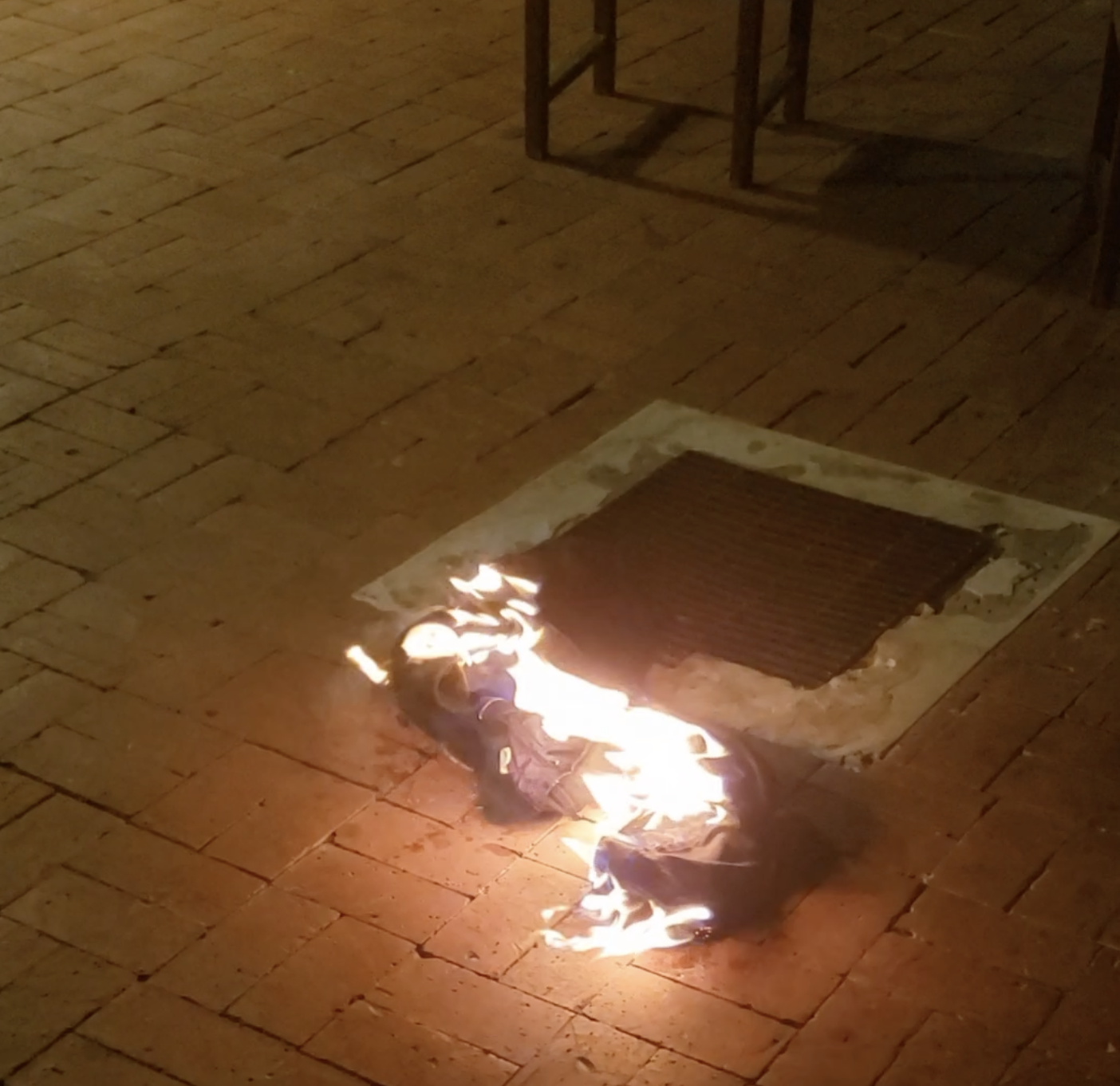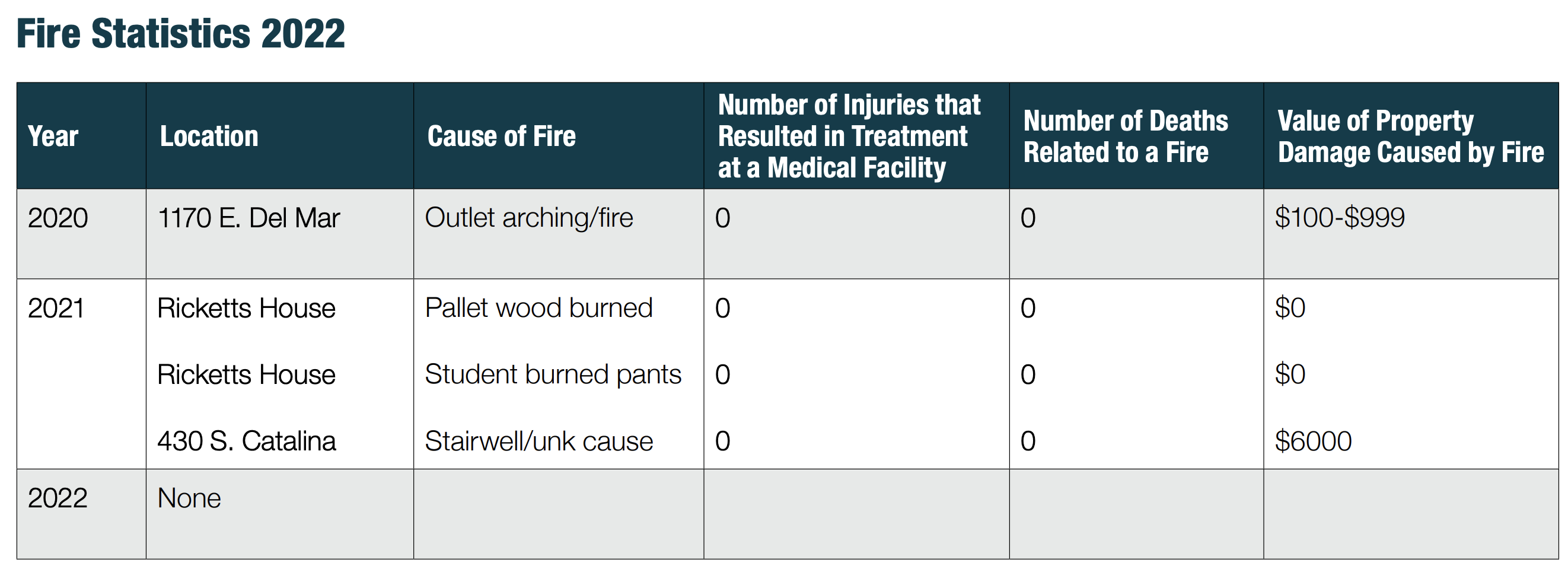We Set Fire to a Pair of Pants. We Put Out the Fire. We Cleaned It Up. They Kicked Us Out of Campus Housing.

This is two-years-old news by now, because the Tech wasn’t publishing much in 2021. But I feel it’s an important story to document nevertheless.
It was Fall Term, 2021 — the first term back on campus since COVID, and the first term ever on campus for both freshmen and sophomores.
We all have our “Typical Frosh L” moments during our first terms at Caltech. Some people drink too much at their first party. Some people say dumb shit without thinking, or complain loudly when they ‘only’ got a 90% on an assignment. Some people rank [REDACTED] House 1st on their Rotation Picks List.
For me and four of my friends, ours was deciding to reenact a long-dead South Hovse tradition… and burn something in the Ricketts Hovse Courtyard. It was an old, smelly pair of pants which one of us offered as a sacrifice. They didn’t even burn that well. The whole affair was an exercise in absurdism; Taio Cruz’s Dynamite played in the background on the courtyard speakers as we huddled around the flames, which barely provided enough heat to warm our hands. I was almost disappointed that I wouldn’t get to use the water hose I’d spent ones of minutes untangling.
Of course, this would all be a faint, vaguely amusing memory if an RA didn’t walk by at that moment, admonish us, and take pictures of our IDs — and also those of two uninvolved students who happened to be in the courtyard at the wrong time. We quickly doused the fire and assured the RA we would leave the place better than we found it. A couple of us spent the better part of an hour power-washing the bricks surrounding ground zero.
To be clear, I’m not writing this to defend our actions. It was dumb and immature at best. While I will emphasize that we took reasonable safety precautions, that obviously does not excuse anything. I’m writing this because of how the Deans’ Office responded.
—
The RA’s pictures of our IDs made their way to the Deans. So we all got to have super fun individual interviews with Associate Dean Kristin Weyman, as well as an appeal meeting with Interim Dean Lesley Nye, during which we could plead our case. (Evidently, it was decided that our case would be handled by a Deans’ Investigation instead of the Conduct Review Committee.) In that final Zoom meeting, just days before winter break started, I distinctly remember Dean Nye’s final words to me. She spoke them with a single quantum of light in her eyes.
“Hey, Michael…? Stay away from tinder.”
I have no idea if that was meant to be a pun.
Anyway, the result of the process was a delightful four-page document, arriving just in time for the holidays, titled “Ricketts House arson investigation”. Here are the highlights:
“The students admitted to spending time determining the best location for the fire, including selecting the area next to the grate and having a water hose nearby. Before the fire would spread or any other materials be added to the fire, the RA intervened and told the students to put out the fire.”
Quite a way to spin it. Yes, our “pre-meditated” choice of a non-flammable vicinity for the fire and precautions to prevent the fire from spreading did, in fact, result in the fire not spreading or accruing more materials before the RA approached us. And as for the two uninvolved students?
“The Investigators find that [the bystanders] did not adequately intervene by alerting an authority figure such as Security or an RA, or trying to put it out…”
Finally, the sanctions. For all seven of us, bystanders included:
- Work together with the other students involved to host a fire safety program, in coordination with the Safety office, Campus Security, and Emergency Management, in each of the undergraduate residences
- Conduct Probation for the remainder of the academic year 2021-22
But the best part was saved for just the five “arsonists”:
- Removal from Institute Housing for the remainder of the academic year 2021-22, effective January 3, 2022.
This was one of the gifts of all time to receive on December 14, 2021, as I turned my phone back on after my flight home to Florida for Christmas. I had a lot of feelings about getting to spend my winter break on a wild goose chase for affordable short-term lease options in Pasadena, to begin in barely two weeks, at the height of the COVID Omicron wave!
—
The Deans probably thought they were protecting the Caltech Community from us. But on the contrary, this ruling from the Deans caused the Community to rally around and protect us. I cannot sufficiently express my gratitude; as a freshman, ironically, it was one of the first times I felt truly welcome at Caltech. Several upperclassmen offered to help us search for off-campus housing. Despite it not being their problem, the executive committee of Dabney House (my primary house membership) stuck their necks out to write a letter to the Deans’ Office on my behalf protesting the decision. Some members of the Interhouse Committee (IHC) offered to do the same, and also created a (well-intentioned, if inappropriately public) change.org petition. A beloved former faculty member and professor of a frosh core class even wrote to argue our case.
“Throughout human history,” he wrote, “it has been understood that fire, while alluring and powerful, can be dangerous in the wrong hands. An early occurrence of this idea in our mythology can be found in the story of Prometheus. The gods, having decided that humans were not entirely reliable creatures, had chosen, purely for safety reasons, to withhold from them the secret of fire. The mischievous titan Prometheus, however, admired and sympathized with humans. He stole the fire of the gods and gave its secrets to humankind. Zeus, the leader of the gods, could not let this infraction go unpunished. After all, it was a major safety code violation. Zeus decided that the fair thing to do was to chain Prometheus to a rock, allow an eagle to tear out and eat Prometheus’ liver during the day, and have the liver regrow each night so that the eagle could do the same thing each day.”
“No doubt,” the professor’s letter continued, “all of us find Zeus’ decision in that matter to be easily relatable. But with sufficient hindsight, we can see that it was not the wisest of choices. Zeus comes off as a bit of a tyrant, rather than as the benevolent managerial type that he was. Prometheus comes off as the hero, humanity’s benefactor, and the embodiment of science. Zeus might still be worshipped today had he devoted more of his concern towards his worshippers’ advancement.”
Unfortunately, none of those petitions were even acknowledged by Caltech administration.
—
The Caltech Student Affairs Policy on Fire Safety (available on studentaffairs.caltech.edu), of which we were found to be in violation, states:
“Violations of this Policy may result in investigation and disciplinary action by any of the following, including but not limited to: the Housing Office, the Conduct Review Committee, the Dean of Students, the Vice President for Student Affairs, the Dean of Graduate Studies, or the Graduate Review Board. In addition, the setting of a fire or tampering with fire safety equipment in violation of this Policy will result in a fine of up to $500 for each person involved, in addition to reimbursements for damage. Further violations will result in eviction from Caltech Housing. In the event of a violation of law, state and federal authorities may also take action.”
Of course, this was our first offense of the Policy, so the above passage would seem to rule out the possibility of being evicted from our dorm rooms. However, the administrator in charge of reviewing our second appeal of the decision, Vice President of Student Affairs Kevin Gilmartin, did not see it that way.
“I have reviewed your response, and I do not find that it indicates any justifiable reason to overturn the recommendations… You stated in your appeal that the sanction of removing campus housing ‘is arbitrary’ and upholding the violation would ‘constitute a failure of Caltech administration to follow their own policies.’ On the contrary, the Fire Safety Policy states ‘[v]iolations of this Policy may result in investigation and disciplinary action by any of the following, including but not limited to: the Housing Office, the Conduct Review Committee, the Dean of Students, the Vice President for Student Affairs…’ The recommendations support the Policy sanctions of disciplinary action,” VPSA Gilmartin wrote to me in response to my appeal.
So, essentially, their interpretation of the Policy boils down to, “We can punish you however we want.”
—
Don’t get me wrong; I understand why the Deans felt the need to crack down on this. In addition to fire being a sensitive topic in general for California, there have been multiple serious, high-profile fire incidents in Caltech housing within institutional memory. And, of course, the Campus Fire Safety Right-to-Know Act and the Clery Act legally require universities to report all fires in campus housing to the Department of Education annually. (Source: appa.org/facilities-manager/the-campus-fire-safety-right-to-know-act) If those numbers get too high, Caltech’s federal funding could legitimately be threatened, or worse — the Department of Education could decide to perform an investigation, which wouldn’t be pleasant for anyone involved. (If you think our administration is draconian now, imagine how things would be with the federal government actively breathing down their necks.)
The Clery Act defines “arson” as any intentional setting of fire, even to one’s own property. So if you’ve ever lit a candle in your dorm room (strictly forbidden by Caltech’s Housing Contract), congrats: you’re an arsonist too!

Page 85 of Caltech’s 2023 Annual Security and Fire Safety Report. Ricketts House is the only Caltech student residence in the past four years to have fires without causing any property damage.
Also, to Gilmartin’s credit, he did push back the effective date of our eviction to the end of March 2022, allowing us the winter term to find an apartment. And we did. We lucked out and found a place near Caltech we could rent for 6 months, up until the end of the summer. It was fine. (It actually ended up being cheaper than Caltech housing, all told.)
—
I don’t know if I have a specific moral or call to action for this story. It’s in the past. I mainly just wanted to tell it. If I had to pick a note to end on, it would be the last paragraph of the professor’s letter to VPSA Gilmartin:
“It isn’t just the students expelled from housing who are watching. They are in communication with all their friends and how this case is resolved may impact the way in which students interact with faculty quite broadly. If they see you carefully following the letter of the law and exacting the preordained penalty, they will see us one way. If they find you looking for a compromise and trying to return them to the fold, they will see us another way. It is easy to imagine situations in the near future in which we will need their cooperation and good will. Why miss a chance to earn it?”